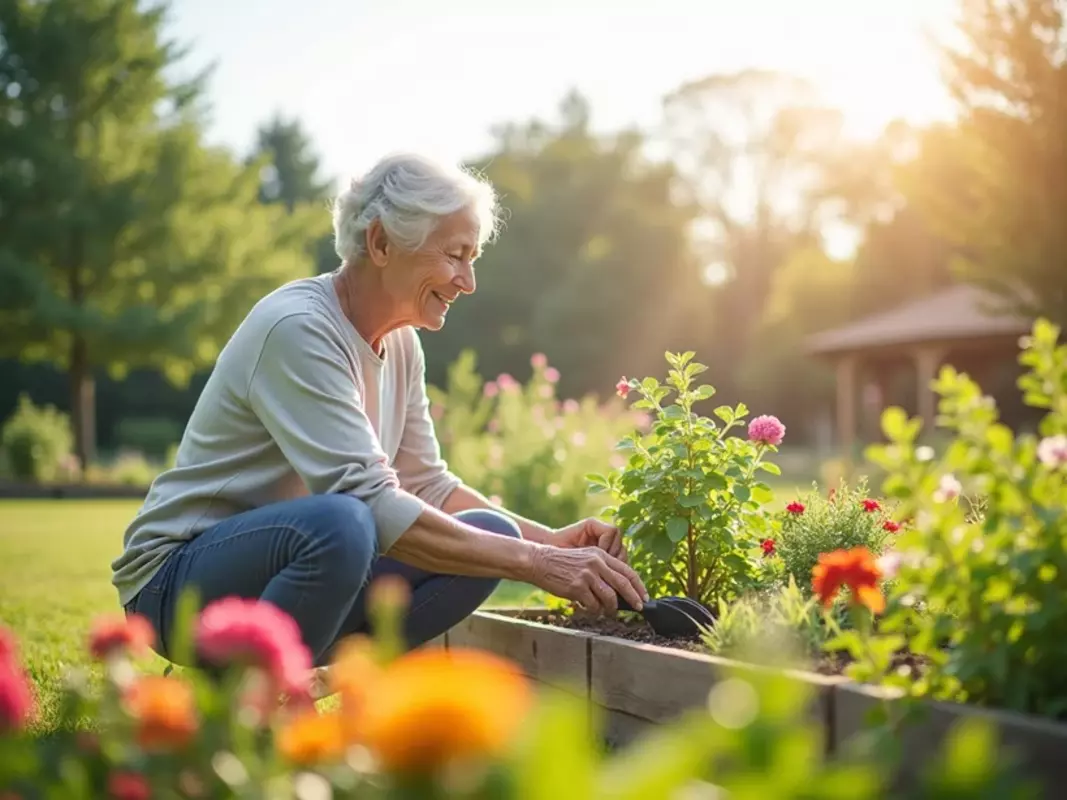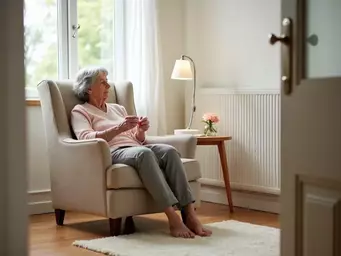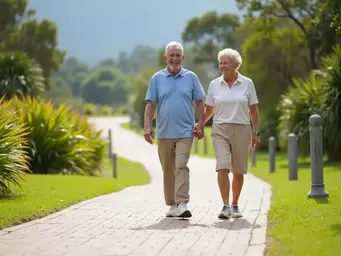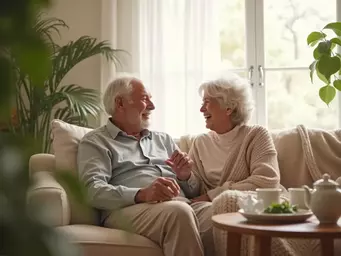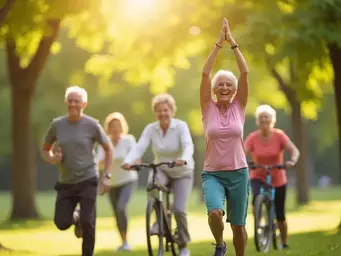Practical Tips for Independent Living

As we age, the concept of independence takes on new meanings. Embracing this phase with dignity, autonomy, and community support can lead to a fulfilling life. What does independence mean to you? Let's explore actionable strategies that empower older adults to thrive.
What You Will Learn
- Independent living is about self-determination, community engagement, and accessibility for older adults.
- Establishing daily routines and staying organized can enhance safety and well-being.
- Regular physical activity and a balanced diet are essential for maintaining health and vitality as we age.
- Utilizing community resources, such as local senior centers and transportation services, fosters social connections and combats loneliness.
- Family involvement and support are crucial for promoting independence and ensuring safety for seniors.
Key Independent Living Tips for Older Adults
Here’s a quick recap of essential strategies for ageing in place, visually summarized below. For more insights on how to maintain your self-sufficiency, consider exploring ways to stay independent with active aging.
Engaging in Regular Physical Activity
Maintain strength and flexibility through activities like walking or yoga.
Balanced Diet Rich in Key Nutrients
Focus on nutrition that supports overall health and wellbeing.
Making Necessary Home Modifications
Ensure safety and accessibility by assessing your living environment.
Utilizing Technology for Daily Living
Enhance your living experience with assistive devices and apps.
Connecting with Community Resources
Engage with local services and programs to combat loneliness.
Encouraging Family Involvement
Involve family members in planning and support for daily tasks.
Essential Independent Living Strategies for Older Adults
As we journey through life, maintaining independence becomes increasingly important. At Cairns Active Ageing Solutions, I believe that understanding what independent living truly means for seniors is the first step to thriving. It’s about more than just living alone; it’s about being empowered to make choices that enhance your quality of life. So, what does it really entail? Let’s explore!
Understanding Independent Living: What It Means for Seniors
Independent living refers to a lifestyle where older adults can manage their own daily activities while receiving support when needed. This autonomy allows seniors to maintain their dignity, engage in social interactions, and participate in community events. Have you thought about what independence means for you? It can take many forms, and understanding these can help you make informed choices.
- Self-Determination: Making your own choices about day-to-day activities
- Community Engagement: Participating in local events and activities
- Accessibility: Ensuring your home and surroundings meet your needs
At Cairns Active Ageing Solutions, we aim to provide resources that help seniors navigate their unique paths to independence. Every small step counts, and I encourage you to embrace what independent living means for you and your lifestyle.
The Importance of Daily Living Tips
Daily living tips are crucial for seniors wanting to maintain their independence safely and confidently. By incorporating these strategies, you can enhance your physical, mental, and emotional well-being. Are you ready to discover some helpful tips? Here are a few key ones to consider, including how ensuring home safety for seniors can significantly reduce risks and promote peace of mind:
- Establish Routines: Set a daily schedule for meals, exercise, and social engagements.
- Stay Organized: Use calendars or reminders for appointments and medications.
- Safe Home Practices: Implement safety measures to reduce the risk of falls and injuries.
By embracing these daily living tips, seniors can foster a sense of purpose and decrease feelings of isolation. Remember, each step you take towards independence matters, and I’m here to support you through that journey!
Health and Wellness Practices for Aging Adults
Taking charge of your health is a vital component of independent living. Whether it’s through nutrition, exercise, or mental well-being, focusing on health practices can make a world of difference as we age. At Cairns Active Ageing Solutions, I’m excited to share some essential health tips that can enhance your quality of life.
Pro Tip
Did you know? Engaging in regular social activities can significantly enhance your mental well-being and overall happiness. Try to make it a point to join community events or classes that interest you. Not only will this help you stay active, but it will also allow you to meet new friends and foster important connections in your community!
Summarizing Key Independent Living Tips for Seniors
As we wrap up our discussion on independent living, it’s essential to highlight the strategies that really make a difference. At Cairns Active Ageing Solutions, I’ve seen firsthand how practical tips can empower seniors to live confidently and independently. From enhancing home safety to engaging in community activities, these strategies are designed to support our beloved older adults in maintaining their autonomy.
Here’s a quick recap of essential strategies for ageing in place:
- Engaging in regular physical activity to maintain strength and flexibility.
- Following a balanced diet rich in key nutrients that support overall health.
- Making necessary home modifications to ensure safety and accessibility.
- Utilizing technology to enhance daily living and provide peace of mind.
- Connecting with community resources and support systems for social engagement.
These tips aren’t just suggestions; they’re vital tools that can lead to a fulfilling and active lifestyle for seniors. Whether it’s through taking that morning walk or finding new hobbies, embracing these practices can significantly impact one’s quality of life.
The Role of Community and Resources in Supporting Independence
Community plays a crucial role in fostering independence among seniors. Support from local organizations, like Cairns Active Ageing Solutions, can be a game-changer. We provide resources that help seniors connect with each other, share experiences, and build meaningful relationships. To learn more about fostering connections, read about embracing active ageing together.
Here are some resources that can help strengthen community ties:
- Local senior centers offering activities and classes.
- Volunteer programs that encourage seniors to give back.
- Transportation services for easier access to social events and appointments.
- Online platforms for virtual engagement and support groups.
By staying connected with others, seniors can combat loneliness and enrich their lives. It’s about more than just support; it’s about building a vibrant network that empowers seniors to thrive.
Taking Action: Next Steps for Older Adults Seeking Independence
If you or a loved one are considering taking the leap toward greater independence, there are several actionable steps to get started! At Cairns Active Ageing Solutions, I’m committed to guiding you through this journey. The key is to utilize the available resources effectively and to seek help when needed.
Here’s how you can take action:
- Research local senior resources and support services in your area.
- Join community groups that focus on shared interests and activities.
- Attend workshops or seminars on topics related to independent living.
- Explore transportation options to enhance mobility and access.
With the right support, the path to independence can be smooth and rewarding. Remember, every step you take towards independence is a step towards a more fulfilling life!
Encouraging Family Involvement in Senior Independence
Family support is vital for seniors striving for independence. Encouraging family members to be actively involved can make a world of difference. It’s not just about physical assistance; emotional support plays a significant role too!
Here are a few ways families can contribute:
- Discussing and planning for future living arrangements together.
- Assisting with daily tasks while promoting self-sufficiency.
- Encouraging participation in social activities and community events.
- Ensuring safety measures are in place at home.
Additionally, having a caregiver or a personal care assistant can help bridge the gap when family members are not available. They not only provide essential support but also promote a sense of companionship, which is invaluable for mental well-being. For further reading on related topics, you might find value in understanding physical activity benefits for seniors.
Recap of Key Points
Here is a quick recap of the important points discussed in the article:
- Understanding Independent Living: It's about empowering seniors to make choices that enhance their quality of life, focusing on self-determination, community engagement, and accessibility.
- Daily Living Tips: Establish routines, stay organized, and implement safety practices to maintain independence and well-being.
- Health and Wellness: Engaging in physical activity, following a balanced diet, and making home modifications are vital for aging in place successfully.
- Community Support: Local resources, such as senior centers and transportation services, can significantly enhance social engagement and independence for seniors.
- Family Involvement: Encouraging family support through discussions, assistance with tasks, and promoting social participation is crucial for fostering independence in seniors.
Frequently Asked Questions About Independent Living for Seniors
- What does independent living mean for older adults?
- Independent living for older adults signifies a lifestyle where seniors can manage their daily activities, make personal choices, and engage in their community while having access to support when needed. It emphasizes autonomy, dignity, and a high quality of life rather than living completely without assistance.
- What are some key daily living tips for seniors to maintain independence?
- Key daily living tips include establishing regular routines for meals and activities, staying organized with calendars and reminders, and implementing safe home practices to prevent falls and other injuries. These practices help seniors live confidently and reduce feelings of isolation.
- How important are health and wellness practices for independent living?
- Health and wellness practices are crucial for maintaining independent living. Regular physical activity, a balanced diet rich in essential nutrients, and mental well-being exercises are vital. These practices enhance physical strength, cognitive function, and overall vitality, enabling seniors to thrive.
- What role do community resources play in supporting senior independence?
- Community resources are instrumental in supporting senior independence by fostering social connections and providing essential services. Local senior centers, volunteer programs, transportation services, and online support groups help combat loneliness, encourage engagement, and empower seniors to lead vibrant, connected lives.
- How can family members contribute to a senior's independence?
- Family members can significantly contribute to a senior's independence by actively involving themselves in planning and support. This includes discussing future living arrangements, assisting with daily tasks while promoting self-sufficiency, encouraging participation in social activities, and ensuring safety measures are in place at home. Emotional support and companionship are also invaluable.



